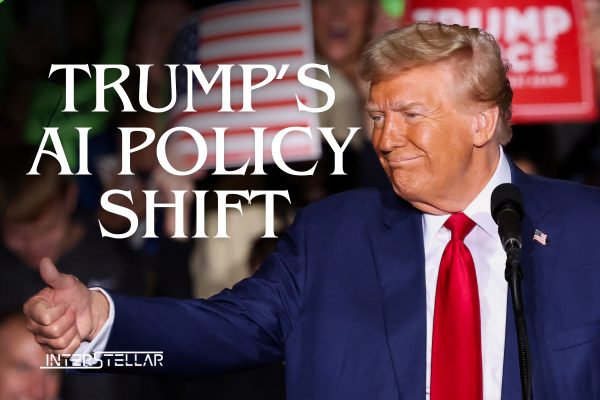AI Policy at a Crossroads: Trump’s Second Term and the Future of Regulation
As artificial intelligence (AI) reaches a transformative stage, the US federal government is poised for an AI Policy Shift. With President-elect Donald Trump preparing to take office, AI policy will move from a focus on safeguards under President Joe Biden to an agenda prioritising reduced regulatory hurdles. This shift excites some investors but raises concerns about the potential rollback of protections, especially in the use of AI deepfakes in elections.
Trump’s AI Vision: Promoting Innovation Amid Concerns
Donald Trump has promised to rescind Biden’s sweeping AI executive order, which aimed to balance innovation with protecting public safety and rights. While Trump has not outlined a replacement, the Republican National Committee’s revised platform advocates for AI development rooted in “Free Speech and Human Flourishing.”
Trump’s stance reflects both scepticism and enthusiasm for AI. In a Fox Business interview, he called AI “very dangerous” and “so scary,” while his campaign embraced AI-generated images for political messaging. Close advisers, including Elon Musk, have also expressed mixed views, alternately highlighting AI’s risks and potential.
The upcoming Republican-controlled Congress seems less likely to regulate AI in political campaigns, prioritising free speech and avoiding measures that could stifle technological innovation.
Key AI Policy Debates in Congress
While comprehensive AI legislation has eluded Congress for years, bipartisan interest exists in areas like national security and curbing the misuse of AI for explicit, non-consensual content. However, regulating election-related AI use, such as deepfakes, may take a backseat.
Republican Representative Jay Obernolte, a prominent voice in AI policy, argues for balance. “We need a framework to prevent harmful outcomes while enabling innovation,” he said. Democratic Senator Gary Peters is hopeful that common ground on national security could spur legislative progress.
Still, concerns linger about industry influence. For instance, Trump is reportedly considering Musk as a top AI adviser, a move that some critics worry could prioritise corporate interests over public safety.
AI’s Role in Elections: Lessons from 2024
AI played a subtle yet significant role in the 2024 election. While fears of a major deepfake scandal were unrealised, AI was used to create targeted campaign messages, memes, and even fake robocalls mimicking Joe Biden’s voice.
Such tactics deepened partisan divides and contributed to voter mistrust in digital content. Foreign actors also used AI tools to spread disinformation through fake profiles and websites. These developments underscore the need for guardrails to ensure responsible AI use in elections.
Industry Advocates Push for Federal Guidelines
AI industry leaders stress that clear federal regulations could foster innovation while protecting public interest. Craig Albright of The Software Alliance emphasised that national laws would create consistent standards, enabling safe and reliable AI growth. Similarly, Suresh Venkatasubramanian, a former Biden adviser, likened regulations to traffic rules, enabling rapid yet safe progress.
Advocacy groups like Public Citizen argue that safeguards promote innovation while ensuring AI serves society. However, Trump’s pledge to rescind Biden’s executive order casts doubt on the future of such protections.
As the federal government shifts its focus, the balance between innovation and regulation remains uncertain. For now, AI’s rapid evolution continues to outpace legislative efforts, leaving critical questions about its ethical use unanswered.
With inputs from Reuters





